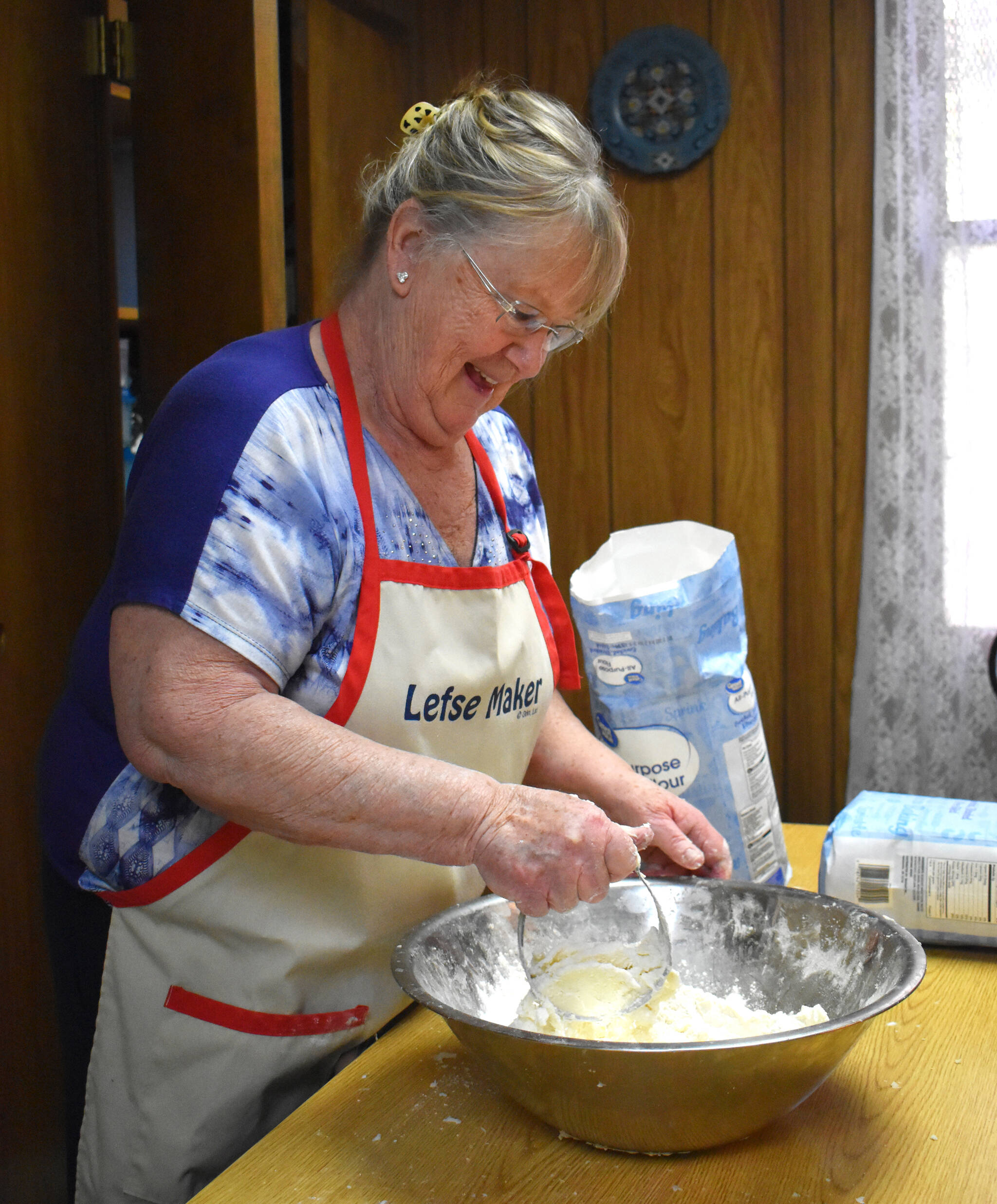Through the years, a whole lot of love of Norwegian culture and history spread throughout Sons of Norway Grays Harbor in Aberdeen.
The friendly and welcoming people who make up the nonprofit organization — mostly of Norwegian heritage or from Norway — showed some of the passion they have for their Scandinavian roots on Tuesday afternoon at the Sons of Norway Grays Harbor building on Randall Street in East Aberdeen.
The reason for uniting about 20 or so volunteers inside the building was in order to continue preparing for their annual Lutefisk and Meatball Dinner by making a simple dish — lefse. A product made of potato, flour, water, milk and butter, it’s used as a side with an entree.
Some people flattened and stretched the dough with rolling pins, another mashed the dough in a mixing bowl, others slathered the interior of the dough with butter, and a couple others grilled the dough, which gave the lefse its signature look.
And everyone had a smile on their face as they got together and do what they love.
Lynette Reime, along with several other people equipped with a flour-covered rolling pin, said preparing for the dinner made for a busy time.
The dough isn’t easy to make either. The hard-working, apron-clad women and men flexed their arms vigorously as the flour flew above the rolling table and the surrounding countertops. At one of the heads of that table where the dough was rolled stood Glendora Dillon, who was wearing an apron that read “Lefse Maker.”
“She’s our Lefse Master,” Reime said of Dillon, whose efforts made enough dough in each batch to create 16 lefse.
Come Sunday afternoon, Jan. 15, there will be a lot more lefse to go around.
The ladies who stretched and flattened out the dough with rolling pins worked meticulously to get the dough just right. Janie Valentine, who was hard at work along with several other friends at the table, said the dough needs to be very thin.
“The joke about lefse is it’s so thin you might use it as a napkin,” Valentine said through some laughter.
Before the dough is ready for handling, it has to be chilled overnight and then it’s mixed. The inviting scent of the buttered Norwegian flatbread permeated throughout the space.
Dillon, along with several other people who spoke to The Daily World, said getting people together was her favorite part. She wasn’t the only person who had that opinion. Jane Lauzon said something similar.
“I think it’s a very good social event, especially after COVID,” said Lauzon, who was buttering and then folding the dough in the next room. “I think it’s great we get to carry the Norwegian traditions.”
Haldis Totland, a Norwegian-American immigrant who was working alongside Lauzon at the buttering table, was thoroughly enjoying her time, too, even if it was laborious.
“It’s a little bit of hard work to do this. You can’t just come off the street,” said Totland, who expressed how it was worth it to keep the annual tradition going. “There aren’t many of us left to keep things like this alive. The people here love lefse and they love to learn how to make it.”
While Totland, Lauzon and Ella Seely were spreading one side of the dough with the creamy, salted butter, they talked about how Norwegian immigrants — along with immigrants from other countries — often had to change their names upon entering the United States.
“We hadn’t been here a week before my sister and I received a different name,” Seely said.
In addition to talking about the different societal differences immigrants had to make, people also talked about the different spellings found throughout Norway, Sweden and Finland.
In fact, an easy, general trick to recognize a person’s country heritage is if the last name ends with the spelling “son,” the person is Swedish. If the name ends with “sen,” the person is Nordic. That’s important, especially for the members of Sons of Norway and other cultural groups, who are trying to keep their culture, heritage and traditions alive.
While many of the volunteers were older, the youngest person in the group, Andrea Krause, explained what got her started with Sons of Norway.
“I’ve been involved since I was 5, so it’s been about 25 years,” Krause said. “I was involved in Sons of Norway youth camps all over Washington and Oregon. We learned about the language and culture.”
Krause shared her favorite thing besides the rolling of the lefse.
“It’s seeing everybody I’ve known since I was a kid,” Krause said.
Dixie Thompson, lodge president of the Sons of Norway Grays Harbor, was happy to have her friends all unite to make the lefse, which has many forms. The lefse, which will be served at the dinner on Sunday, Jan. 15, is the most common form of lefse in Norway, and for Norwegian-Americans.
Thompson cheerfully shared her feelings about the day.
“I love being with this group,” said Thompson, who cannot wait for Sunday.
For people who are interested in trying lefse, lutefisk and the meatballs, they can call Thompson at 360-533-2827 to make a reservation. The dinner costs $30 and will be held at the Sons of Norway Grays Harbor building at 717 Randall St., in Aberdeen. The dinner will happen at 2 and 4 p.m., Sunday. The admission will pay to help maintain the building and to keep the lights on.
Contact Reporter Matthew N. Wells at matthew.wells@thedailyworld.com for future story ideas.



